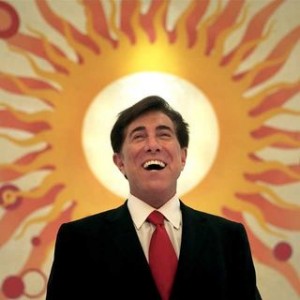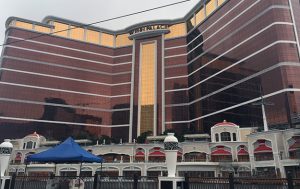This story pretty much writes itself. While MGM Resorts International cowboys up and makes it clear who’s sponsoring the ad — not hiding behind some phony-baloney PAC name like “Citizens for a Stronger Connecticut” — but the commercial is a rehash of tiresomely familiar political tropes: ominous music, insinuating voice-overs and cherry-picked quotes. While the MGM ad leads one to believe the Bradley International Airport casino is a done deal, lawmakers say ‘Not so fast!’ Besides, who wants to go to an airport — of all places — to gamble? Nobody thinks of airports and “fun” in the same breath anymore.
* Given all the anticipation, the actual opening of Wynn Palace was almost anticlimactic. Few casino projects have been so heavily debated as this one, and analysts were still arguing about down to the wire. All the guidance that Steve Wynn would give about the megaresort’s ROI was that it would be “fine” (which could mean anything in  the era of diminished expectations that is present-day Macao). Daiwa Capital Markets analyst Jamie Soo wrote that Wall Street‘s expectations for the new wave of casinos were “too optimistic … Macau is clearly operating in an environment of increasing costs and mounting competition amid a challenging macro environment.” But Citi analyst George Choi countered that Wynn Palace “is a potential game-changer … We like the earnings improvement that the new Macau property will likely bring to Wynn.” Buckingham Research Group analyst Christopher Jones added that the table-games issue was overblown, writing, “We believe that for Wynn and other operators, peak table capacity is only an issue for major holidays.” As though to head off any criticism that Wynn Palace is too gambling-reliant, its namesake told investors (without going into specifics), “We spent, without exception and without any possibility of contradiction, more money on noncasino attractions in Wynn Palace than has ever been spent on any facility of that sort on the planet Earth.” Wow. That’s pretty big talk.
the era of diminished expectations that is present-day Macao). Daiwa Capital Markets analyst Jamie Soo wrote that Wall Street‘s expectations for the new wave of casinos were “too optimistic … Macau is clearly operating in an environment of increasing costs and mounting competition amid a challenging macro environment.” But Citi analyst George Choi countered that Wynn Palace “is a potential game-changer … We like the earnings improvement that the new Macau property will likely bring to Wynn.” Buckingham Research Group analyst Christopher Jones added that the table-games issue was overblown, writing, “We believe that for Wynn and other operators, peak table capacity is only an issue for major holidays.” As though to head off any criticism that Wynn Palace is too gambling-reliant, its namesake told investors (without going into specifics), “We spent, without exception and without any possibility of contradiction, more money on noncasino attractions in Wynn Palace than has ever been spent on any facility of that sort on the planet Earth.” Wow. That’s pretty big talk.
While GGR Asia itself seemed fairly blasé about the casino opening — roused only by sightings of Arnold Schwarzenegger and Andrea Bocelli — it made it clear that players were anything but indifferent: “All areas of the gaming operation – including the mass  floor, premium mass sections and VIP rooms – were well populated following the property’s opening to the public … Some baccarat tables on the main floor had clusters of players standing two or three deep, ‘back betting’ on what they perceived to be players on a lucky streak that were sitting at the table” — even ones with $129 minimums. In opening-night remarks, Wynn himself threw any remaining modesty to the winds, saying, “To be the prettiest hotel in the world, frankly, is something that money and good taste can buy. But to be the best hotel in the world is something else altogether.”
floor, premium mass sections and VIP rooms – were well populated following the property’s opening to the public … Some baccarat tables on the main floor had clusters of players standing two or three deep, ‘back betting’ on what they perceived to be players on a lucky streak that were sitting at the table” — even ones with $129 minimums. In opening-night remarks, Wynn himself threw any remaining modesty to the winds, saying, “To be the prettiest hotel in the world, frankly, is something that money and good taste can buy. But to be the best hotel in the world is something else altogether.”
Analysts at Sanford Bernstein gave the megaresort a rave review, predicting an approximately 15% return on investment — which would be a damn sight better than “fine” in the current market. “Steve Wynn and his team have built a masterpiece of a luxury integrated resort, or as they were called in the 1990s in Las Vegas – a ‘Super Casino’,” wrote the Bernstein boffins. In addition to Hollywood musclemen and Italian crooners, a whole phalanx of Macanese government officials turned out for the opening, signaling that Wynn’s on-again, off-again honeymoon with Macao was back in one of its “on” phases.
* Almost all the metrics are looking good in Atlantic City, where operating profits for casinos rose 21% in the first half of the year. Bunched at the top in the second quarter were Borgata, Resorts Atlantic City and Tropicana Atlantic City, up 27%, 26% and 25%  respectively. Bally’s has overcome its identity crisis to post an 8% upswing (although the Caesars Entertainment trio was flat overall) and — for all of Carl Icahn‘s poor-mouthing — Trump Taj Mahal swung from a 2Q15 loss of $10 million to a $2 million profit. Year over year, Caesars Interactive‘s second-quarter profits shot up from $857,700 to over $5 million. Resorts Digital halved its $3 million loss of a year ago. Hotel occupancy perhaps could have been better — 79% — but at least ADRs were $102, with Borgata leading the way, as you’d expect.
respectively. Bally’s has overcome its identity crisis to post an 8% upswing (although the Caesars Entertainment trio was flat overall) and — for all of Carl Icahn‘s poor-mouthing — Trump Taj Mahal swung from a 2Q15 loss of $10 million to a $2 million profit. Year over year, Caesars Interactive‘s second-quarter profits shot up from $857,700 to over $5 million. Resorts Digital halved its $3 million loss of a year ago. Hotel occupancy perhaps could have been better — 79% — but at least ADRs were $102, with Borgata leading the way, as you’d expect.
* In a perplexing move, Isle of Capri Casinos is pulling out of the Lake Charles area. The company will use the proceeds from the sale to pay down debt. The new owners will be Laguna Development Corp. and they’re putting their$134.5 million in the right place: Louisiana‘s top gambling market. Isle is getting almost 8X cash flow for its casino, roughly industry average, although you’d think a Lake Charles property would command a bit more.
* Racinos at four Alabama dog tracks were nixed by the state Senate but that august body decisively approved a lottery, moving the issue to the House and thence (if all goes well) to the November ballot, the governor’s signature already assured. More of the expected proceeds will be used to prop up the state budget, with modest amounts set aside to fund Medicaid and education.

It did not go well with the Alabama House of Representatives. Opponents to the lottery bill blocked it with a procedural vote which did not allow a committee to meet (and approve the bill) while the House was in session, so the bill could not be brought up before the midnight Tuesday deadline. In other Alabama gambling news, Milt McGregor plans to reopen his Victoryland on September 13 with new Bingo machines.